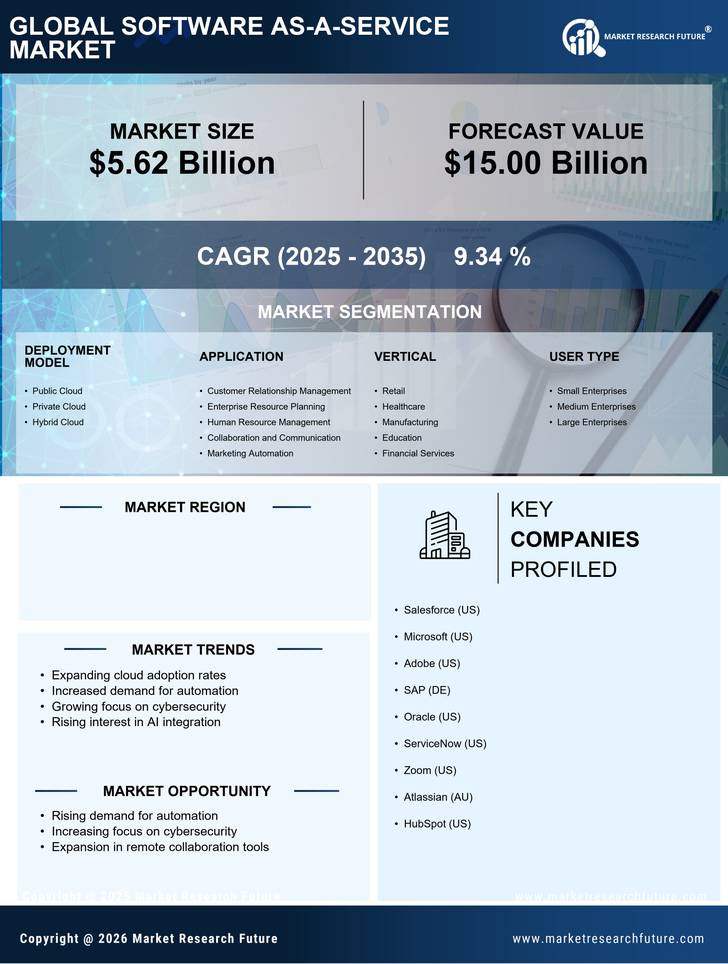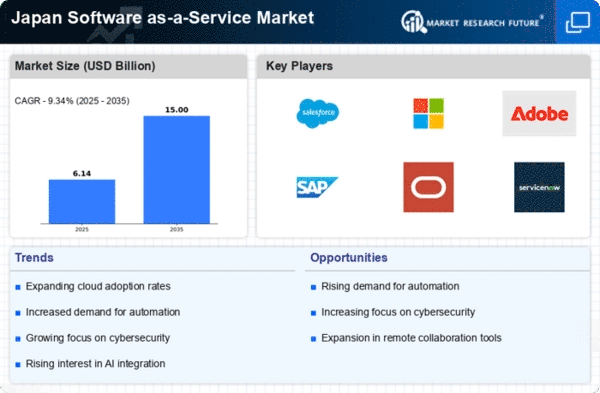Expansion of E-commerce Platforms
The expansion of e-commerce platforms is significantly influencing the software as-a-service market in Japan. As consumer behavior shifts towards online shopping, businesses are increasingly seeking SaaS solutions that facilitate e-commerce operations. This trend is underscored by a reported increase of 25% in e-commerce sales in Japan over the past year. The software as-a-service market is responding by offering specialized tools for inventory management, payment processing, and customer relationship management. These solutions enable businesses to streamline their operations and enhance the customer experience. As the e-commerce landscape continues to evolve, the demand for SaaS applications tailored to this sector is expected to grow, providing opportunities for innovation and market expansion.
Integration of Artificial Intelligence
The integration of artificial intelligence (AI) into the software as-a-service market is transforming how businesses operate in Japan. AI-driven SaaS solutions are increasingly being utilized to automate processes, analyze data, and enhance decision-making capabilities. This trend is evidenced by a significant increase in investments in AI technologies, with projections indicating that the AI market in Japan could reach ¥1 trillion by 2025. The software as-a-service market is leveraging AI to provide personalized user experiences and predictive analytics, which can lead to improved customer satisfaction and retention. As organizations recognize the potential of AI to drive efficiency and innovation, the demand for AI-enabled SaaS products is likely to continue its upward trajectory.
Rising Demand for Remote Work Solutions
The software as-a-service market in Japan experiences a notable surge in demand for remote work solutions. As organizations increasingly adopt flexible work arrangements, the need for cloud-based collaboration tools becomes paramount. This shift is reflected in a reported growth rate of approximately 20% in the adoption of SaaS applications tailored for remote work. Companies are seeking solutions that facilitate seamless communication and project management, thereby enhancing productivity. The software as-a-service market is responding by offering innovative platforms that integrate various functionalities, such as video conferencing and file sharing, into a single interface. This trend not only supports remote teams but also aligns with the broader digital transformation initiatives undertaken by businesses across Japan.
Growing Focus on Cybersecurity Solutions
In the context of the software as-a-service market, the growing focus on cybersecurity solutions is becoming increasingly critical for businesses in Japan. With the rise in cyber threats, organizations are prioritizing the protection of sensitive data and compliance with regulations. The software as-a-service market is responding by developing robust security features, including encryption and multi-factor authentication, to safeguard user information. Recent data indicates that the cybersecurity market in Japan is projected to grow at a CAGR of 15% over the next five years. This heightened emphasis on security not only addresses regulatory requirements but also builds trust among users, thereby driving further adoption of SaaS solutions.
Increased Investment in Digital Transformation
The software as-a-service market in Japan is witnessing increased investment in digital transformation initiatives across various sectors. Organizations are recognizing the need to modernize their operations and enhance their technological capabilities to remain competitive. This trend is reflected in a reported increase of 30% in IT spending on digital transformation projects in the past year. The software as-a-service market plays a crucial role in this transformation by providing scalable and flexible solutions that can adapt to changing business needs. As companies prioritize digitalization, the demand for SaaS products that support these initiatives is likely to rise, fostering innovation and efficiency in the marketplace.

















